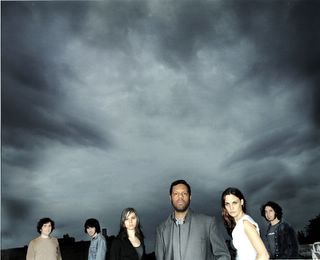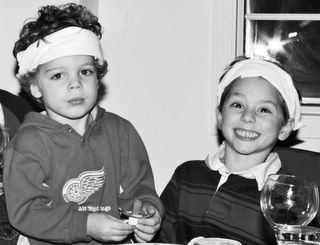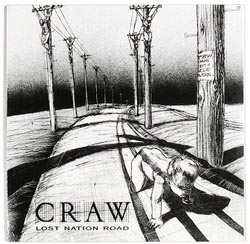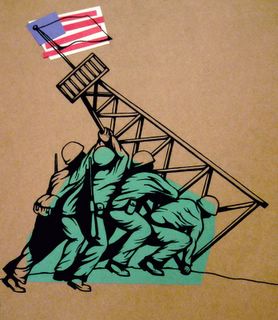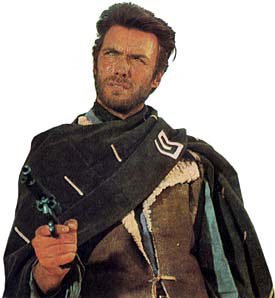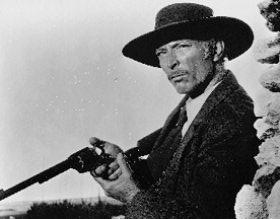Monday, February 28, 2005
The Dears
Here is a sneak peek at the article I wrote regarding Montreal's The Dears. This will appear in the forthcoming Big Takeover magazine for which I write:
THE DEARS
Love Letters From Gehenna
by Paul V. Regelbrugge
From the perspective of experience, why is it that idealism too often sounds naïve, even delusional? Where youth yearns for peace, love and understanding, such aspirations are readily dismissed, “ah, they are young … foolish.” Where middle-aged people demand justice and advocate social and environmental reform and anti-war concerns they are branded zany liberals; head in the clouds dreamers divorced from reality.
Montreal’s The Dears espouse a romanticism and idealism at times informed, and at others annihilated by nihilism. This uneasy tension is played out in their records, on which beauty and melody collide headfirst with the very death of romance and the end of the world. Such clash sometimes results in a complete chaos that sounds as if The Dears are angrily daring the listener to invade they space they are making. Singer/songwriter MURRAY LIGHTBURN’s battlefield is as emotional as it is global. And yet, for all their life and death defying sincerity, The Dears have been patronized by some as pretentious.
“I can’t be bothered with that shit,” scoffed Lightburn in our recent interview. “That’s completely off the mark. Is it pretentious to mean it? Would people only take us seriously if we say nothing challenging, wear the same leather jackets and play the same old riffs already said and done?”
Lightburn confesses that he was in a very dark place, personally, during the writing of their first record, End of a Hollywood Bedtime Story (Grena). Conversely, in light of the increasingly “grim” circumstances in our world, his inward focus changed somewhat to a more global one on the brilliant No Cities Left, released in Canada in 2003 on Universal, and finally in the States on Spinart.
There is nothing passive whatsoever about No Cities Left. The songs arrest the listener, trying him/her before juries pooled on the verge of destruction, amidst the end of the world itself, and finally, within the ensuing reconstruction. “What we want is gone for good,” sings Lightburn on the breathtaking opener and single, “We Can Have It,” “somewhere someone says they’ve got it all, but that’s not even what we want, not even close, it won’t ever be what we want.” Sure, it is cinematic, film noir as some have said, but Lightburn’s struggles to harness an inner rage and forge beauty and hope makes for exciting, often jaw-dropping fare regardless of how long he succeeds in keeping the demons at bay in any one song.
“It’s as if we are programmed to be so aggressive, but we don’t have to be that way,” said Lightburn. “I’m trying every day to fight that side of me. I don’t want to be angry. Rather than useless acts like standing in front of the White House with picket signs, if everybody in every interaction with everyone just tried to do quiet little things, like respecting others and not judging them…. The next time someone asks you on the streets for money, don’t presume you know that he is going to spend it on booze. Respect him; judge not. If all of us acted in such a way, just think what a humongous difference we could make in the world.” Even so, Lightburn is hardly naïve about such aspirations. “I know there is doubt we can do this,” he sings on “Who Are You, Defenders of the Universe?”, “but I can help you.”
As stunning as is No Cities Left, the 2004 Juno-nominated (Canada’s equivalent of the Grammy’s) Dears are even more captivating live. Featuring drummer GEORGE DONOSO III’s Keith Moon-inspired fills and energy; the pretty keyboardists NATALIA YANCHAK (also vocals) and VALERIE JODOIN-KEATON (also flute); efficient bassist MARTIN PELLAND; and newest member PATRICK KRIEF, a guitar phenom who brings so much more to the table, particularly on a monstrous song like “Pinned Together, Falling Apart,” the group colors in spades the sometimes tortured and at others enraptured toils of multi-instrumentalist singer Lightburn. In all, The Dears are as visually striking as they are sonically brilliant.
And they are also relentlessly touring. Having played coast to coast and back again across the ridiculously vast Canada for No Cities Left in 2003, they turned their attention in 2004 and to start 2005 in the U.S. and Europe. In doing so, Lightburn has been appalled to confront the age-old dilemma of longstanding fans mourning the increasingly widespread acceptance, if not popularity of their favorite little cult band. One major Canadian music publication, ChartAttack bemoaned: “It’s a bit sad to see our fave band releasing No Cities Left (and touring) throughout Europe (and the U.S.) – it’s kind of like having a really talented friend who suddenly starts getting the attention of people you don’t know … and inevitably you end up reminiscing about some stupid story on (VH1’s) Behind The Music.” “I just don’t get that,” sighed Lightburn. “You’d think they’d be happy for us.”
Having been weaned on The Smiths and Britpop wonders Blur, Lightburn’s music easily distances The Dears from their inspirations, notwithstanding certain vocal similarities between Lightburn and Morrissey and Damon Albarn. Indeed, the U.S. version of No Cities Left omits the one song that undeniably does resemble the jangly, crooning magnificence of The Smiths at their best, “Don’t Lose The Faith.” Moreover, any such comparisons foolishly ignore The Dears’ more orchestral, rebellious and, ultimately, intense music. “Influences must be outgrown, idols must be killed,” says Lightburn. Nevertheless, Lightburn and The Dears were positively thrilled to have had the opportunity last fall to support Morrissey in Toronto. Asked if he was afforded the chance to meet and hang out with the Mozzer, Lightburn laughed: “Well, I did meet him and it was just incredible to observe him throughout the day. But you don’t just hang with Morrissey. He is, after all, Morrissey.”
Love Letters From Gehenna
by Paul V. Regelbrugge
From the perspective of experience, why is it that idealism too often sounds naïve, even delusional? Where youth yearns for peace, love and understanding, such aspirations are readily dismissed, “ah, they are young … foolish.” Where middle-aged people demand justice and advocate social and environmental reform and anti-war concerns they are branded zany liberals; head in the clouds dreamers divorced from reality.
Montreal’s The Dears espouse a romanticism and idealism at times informed, and at others annihilated by nihilism. This uneasy tension is played out in their records, on which beauty and melody collide headfirst with the very death of romance and the end of the world. Such clash sometimes results in a complete chaos that sounds as if The Dears are angrily daring the listener to invade they space they are making. Singer/songwriter MURRAY LIGHTBURN’s battlefield is as emotional as it is global. And yet, for all their life and death defying sincerity, The Dears have been patronized by some as pretentious.
“I can’t be bothered with that shit,” scoffed Lightburn in our recent interview. “That’s completely off the mark. Is it pretentious to mean it? Would people only take us seriously if we say nothing challenging, wear the same leather jackets and play the same old riffs already said and done?”
Lightburn confesses that he was in a very dark place, personally, during the writing of their first record, End of a Hollywood Bedtime Story (Grena). Conversely, in light of the increasingly “grim” circumstances in our world, his inward focus changed somewhat to a more global one on the brilliant No Cities Left, released in Canada in 2003 on Universal, and finally in the States on Spinart.
There is nothing passive whatsoever about No Cities Left. The songs arrest the listener, trying him/her before juries pooled on the verge of destruction, amidst the end of the world itself, and finally, within the ensuing reconstruction. “What we want is gone for good,” sings Lightburn on the breathtaking opener and single, “We Can Have It,” “somewhere someone says they’ve got it all, but that’s not even what we want, not even close, it won’t ever be what we want.” Sure, it is cinematic, film noir as some have said, but Lightburn’s struggles to harness an inner rage and forge beauty and hope makes for exciting, often jaw-dropping fare regardless of how long he succeeds in keeping the demons at bay in any one song.
“It’s as if we are programmed to be so aggressive, but we don’t have to be that way,” said Lightburn. “I’m trying every day to fight that side of me. I don’t want to be angry. Rather than useless acts like standing in front of the White House with picket signs, if everybody in every interaction with everyone just tried to do quiet little things, like respecting others and not judging them…. The next time someone asks you on the streets for money, don’t presume you know that he is going to spend it on booze. Respect him; judge not. If all of us acted in such a way, just think what a humongous difference we could make in the world.” Even so, Lightburn is hardly naïve about such aspirations. “I know there is doubt we can do this,” he sings on “Who Are You, Defenders of the Universe?”, “but I can help you.”
As stunning as is No Cities Left, the 2004 Juno-nominated (Canada’s equivalent of the Grammy’s) Dears are even more captivating live. Featuring drummer GEORGE DONOSO III’s Keith Moon-inspired fills and energy; the pretty keyboardists NATALIA YANCHAK (also vocals) and VALERIE JODOIN-KEATON (also flute); efficient bassist MARTIN PELLAND; and newest member PATRICK KRIEF, a guitar phenom who brings so much more to the table, particularly on a monstrous song like “Pinned Together, Falling Apart,” the group colors in spades the sometimes tortured and at others enraptured toils of multi-instrumentalist singer Lightburn. In all, The Dears are as visually striking as they are sonically brilliant.
And they are also relentlessly touring. Having played coast to coast and back again across the ridiculously vast Canada for No Cities Left in 2003, they turned their attention in 2004 and to start 2005 in the U.S. and Europe. In doing so, Lightburn has been appalled to confront the age-old dilemma of longstanding fans mourning the increasingly widespread acceptance, if not popularity of their favorite little cult band. One major Canadian music publication, ChartAttack bemoaned: “It’s a bit sad to see our fave band releasing No Cities Left (and touring) throughout Europe (and the U.S.) – it’s kind of like having a really talented friend who suddenly starts getting the attention of people you don’t know … and inevitably you end up reminiscing about some stupid story on (VH1’s) Behind The Music.” “I just don’t get that,” sighed Lightburn. “You’d think they’d be happy for us.”
Having been weaned on The Smiths and Britpop wonders Blur, Lightburn’s music easily distances The Dears from their inspirations, notwithstanding certain vocal similarities between Lightburn and Morrissey and Damon Albarn. Indeed, the U.S. version of No Cities Left omits the one song that undeniably does resemble the jangly, crooning magnificence of The Smiths at their best, “Don’t Lose The Faith.” Moreover, any such comparisons foolishly ignore The Dears’ more orchestral, rebellious and, ultimately, intense music. “Influences must be outgrown, idols must be killed,” says Lightburn. Nevertheless, Lightburn and The Dears were positively thrilled to have had the opportunity last fall to support Morrissey in Toronto. Asked if he was afforded the chance to meet and hang out with the Mozzer, Lightburn laughed: “Well, I did meet him and it was just incredible to observe him throughout the day. But you don’t just hang with Morrissey. He is, after all, Morrissey.”
Saturday, February 26, 2005
Thursday, February 24, 2005
Wednesday, February 23, 2005
Tuesday, February 22, 2005
canadian bacon
So this is how Canada seeks to retain its waning Canadian culture in the face of Uncle Sam's sheer will, let alone: Recurring bans on Canadian beef; annihilation of its national, beloved game (hockey sur glace); and general pissed off nature because of Canada's opposition to more widescale missile defence funding:
Report: More Canadian trash in Michigan landfills, drop in in-state trash
Tuesday, February 22, 2005
BY AMY F. BAILEYASSOCIATED PRESS
LANSING -- The amount of Canadian trash dumped in Michigan landfills climbed 23 percent in the most recent fiscal year, according to a new report released Tuesday.
The state Department of Environmental Quality's solid waste report showed that while trash coming into Michigan from Canada grew in the 2003-04 budget year, the amount of trash generated by Michigan residents dropped by 2 percent.
Frank Ruswick, Department Director Steven Chester's special assistant, said the amount of Canadian trash dumped in Michigan may have gone up between Oct. 1, 2003 and Sept. 30, 2004 because Toronto began sending all its refuse in January 2003. Toronto -- Canada's most populous city -- sends all 1.1 million tons per year of its trash to the Carleton Farms landfill in Wayne County's Sumpter Township.
Canada reported dumping 11.5 million cubic yards of trash in Michigan, about 2 million cubic yards more than the previous budget year.
Report: More Canadian trash in Michigan landfills, drop in in-state trash
Tuesday, February 22, 2005
BY AMY F. BAILEYASSOCIATED PRESS
LANSING -- The amount of Canadian trash dumped in Michigan landfills climbed 23 percent in the most recent fiscal year, according to a new report released Tuesday.
The state Department of Environmental Quality's solid waste report showed that while trash coming into Michigan from Canada grew in the 2003-04 budget year, the amount of trash generated by Michigan residents dropped by 2 percent.
Frank Ruswick, Department Director Steven Chester's special assistant, said the amount of Canadian trash dumped in Michigan may have gone up between Oct. 1, 2003 and Sept. 30, 2004 because Toronto began sending all its refuse in January 2003. Toronto -- Canada's most populous city -- sends all 1.1 million tons per year of its trash to the Carleton Farms landfill in Wayne County's Sumpter Township.
Canada reported dumping 11.5 million cubic yards of trash in Michigan, about 2 million cubic yards more than the previous budget year.
Monday, February 21, 2005
Sunday, February 20, 2005
it's beginning to and back again
I'm currently writing a short article concerning Montreal's The Dears for the forthcoming issue of the NYC magazine for which I've been writing for many moons, The Big Takeover (www.bigtakeover.com). Had an interesting interview with Murray, singer/protagonist of said Dears a couple of months ago, and I'm only now getting around to trying to crystalize my take on this rather extraordinary band. Lucky for me, they come back to Chicago in three weeks to support the fine Swedes, Soundtrack of our Lives. I'll likely post my Dears' "short-take," or at least a version thereof, once I'm done with it. Meanwhile, I wanted to very briefly salute three new records that have been dominating my brainwaves of late: Bloc Party's Silent Alarm; M83's phenomenal Before The Dawn Heals Us; and Bright Eyes' I'm Wide Awake, It's Morning.
London's Bloc Party is an interesting group in that they feature a rhythm section that is as prominent as any band in the rock confines that I've heard since, maybe Gang of Four. In fact, I get the sense that the staccato drums and punchy bass veritably form the pillar around which the splendid atmospheric, reverb-laden guitars and caterwauling singing are conceived. It's brilliant at times, obnoxiously dance music at others, but it is most often exciting. The first song alone, "Like Eating Glass," will send those --like me -- who cut their teeth on 80s postpunk music into a fistpumping frenzy, and there is plenty more from whence that comes.
France's M83, for my dollar, has far transcended its already highly lauded debut because it has found the magic of the persistence of mood; of elevating and above all affecting senses. I listened to this album several times the day my father died, and I still can't stop listening to it. Particularly starting with the third song, it is frightening, despairing, envigorating, and it is enrapturing. I can't speak highly enough of this truly beautiful, inspiring, and even humbling record.
So much has already been written and said about Coner Oberst's Bright Eyes, so I'll just cut to the chase. I was no fan of this 23 year old, self-indulgent, self-righteous and ridiculously verbose singer/songwriter until this new record. Like I told one friend, when I heard that the venerable, great Emmylou Harris was providing accompaniment on this record, it gave the record instant credibility, what ever the results. Well, it took at least three listens to find this record's heart, but now I've found it I can't let go. It is far more musical than many reviewers are willing to acknowledge, and I'm sorry but I do find his lyrics on this album to be highly engaging, funny, self-effacing and, at bottom, very interesting. Is he all of that, no, but let me call a spade a spade and tip my hat to an excellent, creative and eminently worthwhile album.
London's Bloc Party is an interesting group in that they feature a rhythm section that is as prominent as any band in the rock confines that I've heard since, maybe Gang of Four. In fact, I get the sense that the staccato drums and punchy bass veritably form the pillar around which the splendid atmospheric, reverb-laden guitars and caterwauling singing are conceived. It's brilliant at times, obnoxiously dance music at others, but it is most often exciting. The first song alone, "Like Eating Glass," will send those --like me -- who cut their teeth on 80s postpunk music into a fistpumping frenzy, and there is plenty more from whence that comes.
France's M83, for my dollar, has far transcended its already highly lauded debut because it has found the magic of the persistence of mood; of elevating and above all affecting senses. I listened to this album several times the day my father died, and I still can't stop listening to it. Particularly starting with the third song, it is frightening, despairing, envigorating, and it is enrapturing. I can't speak highly enough of this truly beautiful, inspiring, and even humbling record.
So much has already been written and said about Coner Oberst's Bright Eyes, so I'll just cut to the chase. I was no fan of this 23 year old, self-indulgent, self-righteous and ridiculously verbose singer/songwriter until this new record. Like I told one friend, when I heard that the venerable, great Emmylou Harris was providing accompaniment on this record, it gave the record instant credibility, what ever the results. Well, it took at least three listens to find this record's heart, but now I've found it I can't let go. It is far more musical than many reviewers are willing to acknowledge, and I'm sorry but I do find his lyrics on this album to be highly engaging, funny, self-effacing and, at bottom, very interesting. Is he all of that, no, but let me call a spade a spade and tip my hat to an excellent, creative and eminently worthwhile album.
Saturday, February 19, 2005
Friday, February 18, 2005
Thursday, February 17, 2005
Wednesday, February 16, 2005
turning stones
"halt ... who goes there?
death
approach ... friend"
(excerpt from "forgotten sons" by Marillion)
For the time being, I am burying the more overtly creative writings I've been doing on this site and will devote any or all such future writings to the site I share with my brother Daniel at www.thejesuitsieve.blogspot.com This will enable me to try and expand and diversify things here at the Whorehouse, if, when and as I have the time. In the midst of the multi-faceted issues ensuing my father's death as well as my son Adrien avidly learning to be potty-trained at this time there is still a world going on outside my window, as if I really needed to be reminded of that. I remember in December asking my dad, just after the tsunami hit in Asia, how he felt about the inevitability that he would soon (we had no idea how soon) be missing out on such future happenings. He just shook his head and mustered a half-smile, as he was wont to do. "These are bad times, Paul." Getting worse....
"son watches father scan obituary columns in search of absent school friends
while a generation digests high fibre ignorance
cowering behind curtains and the taped up, painted windows,
decriminalised genocide, provided door to door belsens
pandora's box of holocausts gracefully cruising satellite infested heavens,
waiting, the season of the button, the penultimate migration,
radioactive perfumes, for the fashionably, for the terminally insane
do you realise ... this world is totally fugazi
where are the prophets, where are the visionaries, where are the poets,
to breach the dawn of the sentimental mercenary"
(excerpt from "fugazi" by Marillion)
no child left behind
scribbled it down
on the nape of her neck
a heart shaped world
before she disappeared
through his fingers
the creator weeps
crestfallen
estranged
from ideal
intention
the start of it all
descends
digging for dark
to fill the holes
left by the light
cigarette
in the devil’s bed
after the deed is done
sold his soul
for the sake of a heart
betrayed
a world displaced
from its moorings
drowning
in a lake of fire
so hot
all memory is gone
and in its place
smiles
the happy new horde
behold the creator
to have and to hold
even if the creator
like stolen goods
is recirculated
like new
only spattered with patchwork
dark
in the place of holes
left in light’s wake
on the nape of her neck
a heart shaped world
before she disappeared
through his fingers
the creator weeps
crestfallen
estranged
from ideal
intention
the start of it all
descends
digging for dark
to fill the holes
left by the light
cigarette
in the devil’s bed
after the deed is done
sold his soul
for the sake of a heart
betrayed
a world displaced
from its moorings
drowning
in a lake of fire
so hot
all memory is gone
and in its place
smiles
the happy new horde
behold the creator
to have and to hold
even if the creator
like stolen goods
is recirculated
like new
only spattered with patchwork
dark
in the place of holes
left in light’s wake
Tuesday, February 15, 2005
Monday, February 14, 2005
Sunday, February 13, 2005
il faut des rites
what have you got
now
that hate is dead
she came to the funeral
a perfect day
bagpipes played
out of time
out of place
“huh?
i see no britons
scots
irish...."
and so she groped
for a cigarette
how much longer
and the mourners saw
that morning passed
they saw it
on their watches
and heard the tolling bells
tell tales of hours
fondling their cell phones
set to vibrate
and thinking of other things
like living
not dying
even though they could all
just have died
for a hot cup of coffee
or latte
but they sure knew how
to play the part
of mister
miss
despair
handkerchiefs
sunglasses concealing
mischief
eyes wandering
to mister
miss
anyone other
than the ones they were with
life goes on
ain’t that a shame
hate is dead
long live hate
you would have liked this....
now
that hate is dead
she came to the funeral
a perfect day
bagpipes played
out of time
out of place
“huh?
i see no britons
scots
irish...."
and so she groped
for a cigarette
how much longer
and the mourners saw
that morning passed
they saw it
on their watches
and heard the tolling bells
tell tales of hours
fondling their cell phones
set to vibrate
and thinking of other things
like living
not dying
even though they could all
just have died
for a hot cup of coffee
or latte
but they sure knew how
to play the part
of mister
miss
despair
handkerchiefs
sunglasses concealing
mischief
eyes wandering
to mister
miss
anyone other
than the ones they were with
life goes on
ain’t that a shame
hate is dead
long live hate
you would have liked this....
Thursday, February 10, 2005
faire table rase
like red whiskers
in a sink
she lingers
until she goes
unnoticed
dizzy
in the scent
of the memory
of her perfection
he clings
like a child
to his mother
to olden days
depending on a love
forged in willful blindness
to almost everything
come to think of it
foam around
his tired face
sweeps the blade
sideburn down to chin
mirror serves him
and forsakes him
all in an instant
there is a way
to the light
in all likelihood
but he just can’t stop
looking in the mirror
rehearsing for a scene
in which he finds the light
in the green eyes
of a different woman
in a different place
a different mirror
under which lies
a different sink
red whiskers
noticed
and the sound
of laughter
in a sink
she lingers
until she goes
unnoticed
dizzy
in the scent
of the memory
of her perfection
he clings
like a child
to his mother
to olden days
depending on a love
forged in willful blindness
to almost everything
come to think of it
foam around
his tired face
sweeps the blade
sideburn down to chin
mirror serves him
and forsakes him
all in an instant
there is a way
to the light
in all likelihood
but he just can’t stop
looking in the mirror
rehearsing for a scene
in which he finds the light
in the green eyes
of a different woman
in a different place
a different mirror
under which lies
a different sink
red whiskers
noticed
and the sound
of laughter
Wednesday, February 09, 2005
moral compass
when even sleep
old friend
is too exhausted
to jettison you
anywhere
out of this world
free from guilt
consequence
choices
there is a bullet
nameless to all
save one
the crowd jeers
debris all around
batteries
coins
you just can’t hide
you just can’t run
so now you know
how cousin cain felt
one day you’ll taste
only metal
mince words
several languages
yet none
there are eyes on you
where before
there was only
nothing
and what they see
is what you choose to show
up to you
just in case
the mind still rules
the body
don’t know
just a little something
to contemplate
this long
sleepless
night
'til dawn arouses you
laughs
your folly
old friend
is too exhausted
to jettison you
anywhere
out of this world
free from guilt
consequence
choices
there is a bullet
nameless to all
save one
the crowd jeers
debris all around
batteries
coins
you just can’t hide
you just can’t run
so now you know
how cousin cain felt
one day you’ll taste
only metal
mince words
several languages
yet none
there are eyes on you
where before
there was only
nothing
and what they see
is what you choose to show
up to you
just in case
the mind still rules
the body
don’t know
just a little something
to contemplate
this long
sleepless
night
'til dawn arouses you
laughs
your folly
Tuesday, February 08, 2005
the good grief counsellor
serenade
song of the heart
down here
in a minor key
piano bar
whiskey voice
cigarette smoke
or maybe clouds
beyond which lies heaven
can’t see it
beyond tears
like stained glass
just imagine
there are people
beyond
so unlike people
they don’t come between us
they just love
the little wonders
the moment
so quiet here
way down here
in this head
conjures dreams
willed to life
poses time
in a place
where time is imaginary
where love is
where we are
just for once
song of the heart
down here
in a minor key
piano bar
whiskey voice
cigarette smoke
or maybe clouds
beyond which lies heaven
can’t see it
beyond tears
like stained glass
just imagine
there are people
beyond
so unlike people
they don’t come between us
they just love
the little wonders
the moment
so quiet here
way down here
in this head
conjures dreams
willed to life
poses time
in a place
where time is imaginary
where love is
where we are
just for once
Sunday, February 06, 2005
an arrangement
On Sunday, 30th January 2005, my father, Guido Victor Walter Andrew Regelbrugge died at the age of 66. In all, he had three sons, three stepsons, six granchildren and another one due in May. But that doesn't come close to the heart of my father; the stories of my father. I alone lack the perspective, let alone settled heart and mind to eulogize him, so I won't even try. I loved my dad and he loved me, his first son, more than we probably ever conveyed to each other. However, despite a relationship affected and strained following a divorce the hurt from which he never did shake free notwithstanding a loving second marriage and the passage of 21 years, the point is that we did love each other, we confronted all issues for better and very often for worse, and we would both have acknowledged we never approached in words our mutual love between father and son, son and father. He would often attribute the sub-optimal times in our relationship to a fact of which he was certain; that I was his son most like him in so many ways. Of course, my predictable but unstated actual response would have been one of denial, but the fact is, regardless of the veracity of his belief in this respect, I realize now more than ever how honored I am that he thought of me that way. Moreover, I realize now more than ever that there is no way I could ever touch, influence, mentor, inspire, motivate 1/100th of the people who passed through the classrooms, soccer fields, and living rooms of my father. I am in a different profession, a different life, and though I'd like to believe I have similar speaking and motivational talents, as Talk Talk sings, life is what you make it. It is a long road ahead, and the pain of my dad's death is far too close for me to have sufficient perspective from which to expound upon learned truths; to connect the dots of memory and fact; ascertain to what extent I could or should have done certain things differently; better understand why and how things went bonkers for us only after his remarriage; pick up the pieces left off in his wake -- things unsaid, relationships with others unresolved, honoring commitments I made to him in the weeks before he died and only now realizing the magnitude of such commitments in light of numerous and diverse new revelations the extent to which my dad never knew....
There is one point I do wish to convey at this time. Neither my dad nor I were/are people who revel in regrets (non, je ne regrette rien....), and especially not with respect to facts underlying our own relationship. We were/are too proud, too headstrong for that. But here is the thing. Irrespective of regret, when looking back in hindsight at the times -- days, months, years -- during which we were at odds over one thing or another and the certitude that to this day I still think I was always in the right and I am positive he likewise thought he was always in the right, what a waste; a calamity. How, or why is it that people who love each other so can let such myopic preoccupations and principles stand in the way of the finitude of our times together on this planet? A waste. As my dad suddenly exclaimed to me with reference to a different, but likewise recurrent subject that did not directly involve me one month before he died, "for what?!?" I resolve to think more broadly, of the bigger picture of what ought to be in contrast to the world according to Paul, the gospel according to Paul. This may sound trite but I defy you to tell me you don't lose sight of this fact in your own life from time to holiday and back again. I know we are humans bound to err and we are inherently consumed with ourselves, some far, far more than others, but when it comes to mothers, fathers, siblings, children, spouses, significant others, dear friends ... life is far too short, far too bereft of compassion to drift from, or grow estranged from the ones you love over what are ultimately, for people who will all one day share the ground from whence they came, trivial, egocentric concerns. My wife sighs and wonders how long my new "I love the world" coda will last, knowing me as she does, but the beauty, after all, lies in the trying. To try, is to be. My dad would have liked that sentiment, and would have been proud to know I've arrived at such a mantra, as perhaps he too would have concluded had I predeceased him. It just shouldn't have to take a death to bring such a sentiment to life; make it real....
There is one point I do wish to convey at this time. Neither my dad nor I were/are people who revel in regrets (non, je ne regrette rien....), and especially not with respect to facts underlying our own relationship. We were/are too proud, too headstrong for that. But here is the thing. Irrespective of regret, when looking back in hindsight at the times -- days, months, years -- during which we were at odds over one thing or another and the certitude that to this day I still think I was always in the right and I am positive he likewise thought he was always in the right, what a waste; a calamity. How, or why is it that people who love each other so can let such myopic preoccupations and principles stand in the way of the finitude of our times together on this planet? A waste. As my dad suddenly exclaimed to me with reference to a different, but likewise recurrent subject that did not directly involve me one month before he died, "for what?!?" I resolve to think more broadly, of the bigger picture of what ought to be in contrast to the world according to Paul, the gospel according to Paul. This may sound trite but I defy you to tell me you don't lose sight of this fact in your own life from time to holiday and back again. I know we are humans bound to err and we are inherently consumed with ourselves, some far, far more than others, but when it comes to mothers, fathers, siblings, children, spouses, significant others, dear friends ... life is far too short, far too bereft of compassion to drift from, or grow estranged from the ones you love over what are ultimately, for people who will all one day share the ground from whence they came, trivial, egocentric concerns. My wife sighs and wonders how long my new "I love the world" coda will last, knowing me as she does, but the beauty, after all, lies in the trying. To try, is to be. My dad would have liked that sentiment, and would have been proud to know I've arrived at such a mantra, as perhaps he too would have concluded had I predeceased him. It just shouldn't have to take a death to bring such a sentiment to life; make it real....
Saturday, February 05, 2005
breaking point
just then
you lost it
maybe
a little late
maybe
you were too busy
to see
it didn’t used to be
this way
life in the way
life no more
empty hands
sieve
what is left
what is lost
touching
open hands
close your eyes
behold confusion
day or night
new dawn
setting sun
go
let the emptiness in
go
never leave you
all around you
do no wrong
no right
judgement
from another world
blush
too easily
makes no sense
any of this
sleep
if you can
for the sake of peace
for the sake of love
loss
in a same old world
somehow different
you lost it
maybe
a little late
maybe
you were too busy
to see
it didn’t used to be
this way
life in the way
life no more
empty hands
sieve
what is left
what is lost
touching
open hands
close your eyes
behold confusion
day or night
new dawn
setting sun
go
let the emptiness in
go
never leave you
all around you
do no wrong
no right
judgement
from another world
blush
too easily
makes no sense
any of this
sleep
if you can
for the sake of peace
for the sake of love
loss
in a same old world
somehow different
